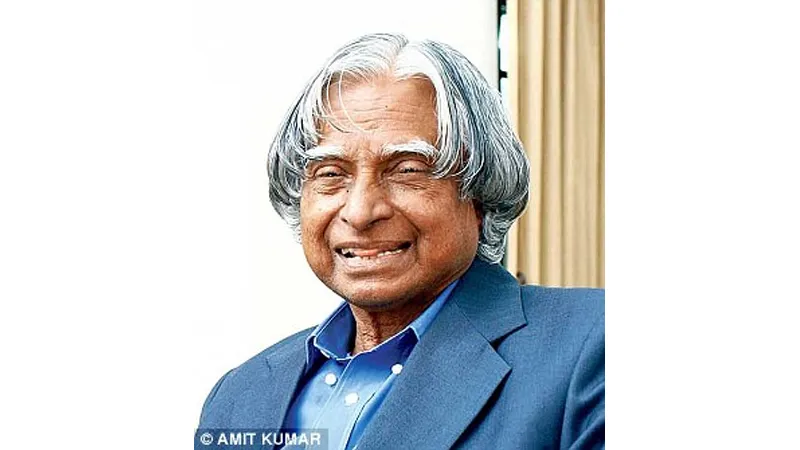Many politicians and leaders go out of their way to claim that they are the aam aadmi. But if there was ever a man of the people, it was A.P.J. Abdul Kalam, who rose from a humble background to become India's true People's President.
I knew Kalam as a reporter specializing in defence since 1986. After the country unveiled its Prithvi and Agni missile programmes, it permitted some access to the man who made them possible, A.P.J. Abdul Kalam.
At the Defence Research and Defence Laboratory in Hyderabad, Kalam was already a legend. He literally worked out of a room in the lab, and had the reputation of working around the clock. But that was only Kalam's second innings as a missile engineer.
He had already attained fame and the attention of New Delhi when he steered the Space Launch Vehicle (SLV) programme to carry out the first launch of a satellite on an Indian launch vehicle in 1980.
Actually Kalam initially joined the DRDO, and was seconded to the ISRO to lead the SLV programme.
After the success of the SLV-3, he was transferred back to the DRDO to head the Integrated Guided Missile Development Programme (IGMDP).
With the success of the Agni, Kalam was a shoo-in for the job of Scientific Adviser to the Defence Minister, who also doubles as the chief of the DRDO.
It was in this job that he came not only to supervise the missile development efforts, but also the critical part of the nuclear weapons which relates to their delivery, detonation and safety.
Success in the missile programme led to the Bharat Ratna in 1997, perhaps the first time a serving scientist had been given such an award.
As the head of the DRDO, Kalam used his enormous authority to pull in funds for defence research as well as overcome the resistance of the Services to Indian-designed and developed products.
He played a significant role in promoting the idea of a Ballistic Missile Defence shield for India and had written to the government requesting funds to develop a hypersonic glide vehicle back in the late 1990s.
In 2002, through a fortuitous set of circumstances, Kalam became the President of India. His finest hour was now about to begin.
Few will doubt that he has been one of the best presidents the country had. He was not a political president, but everyone knew he was a punctiliously correct one.
But more than that, he used the office to connect to the people in a manner no leader has done.
Pandit Nehru may be known as Chacha Nehru, but if anyone saw Kalam working with children they would have few doubts as to who was the real Chacha.
What marked out Kalam was his deep nationalism and his desire to see his country becoming strong and prosperous.
He was himself deeply rooted in Tamil culture - he wrote Tamil poetry and played the Rudra Veena.
But his vision, as expressed in his three books, all best-sellers, was for a scientifically and technologically advanced nation.
Last November, I met him in Beijing where he had been invited for the Beijing Forum hosted by the Peking University.
So impressed was the head of this university that he promptly offered Kalam visiting professorship of his choice, as well as an offer to set up a special lab for him if he required it.
It is fashionable to call everyone a karam yogi after they pass away, but if there was ever a true Karam Yogi, it was Kalam.
He always maintained that even demeanor marked by the clichéd concept of simple living and high thinking. He became a truly inspirational figure for an entire generation of Indian youth.
His world, as we have noted, may have been rooted deep in Indian culture, but his view of the future was truly modern and scientific, completely devoid from any kind of ethnic, sectarian or communal considerations.
Many of our presidents are raised by the office they come to occupy, but Kalam surely raised the stature of the highest office of this land.
(The writer is a Distinguished Fellow at Observer Research Foundation and Contributing Editor of Mail Today)
Courtesy: Mail Today
The views expressed above belong to the author(s). ORF research and analyses now available on Telegram! Click here to access our curated content — blogs, longforms and interviews.

